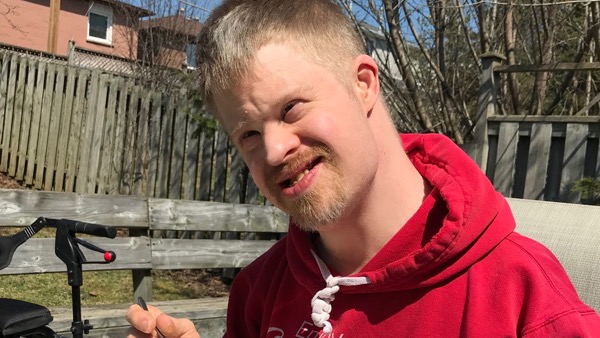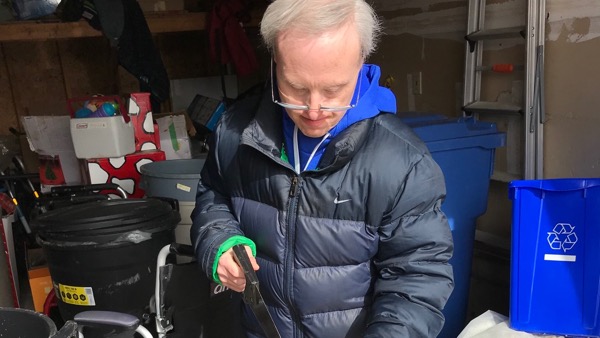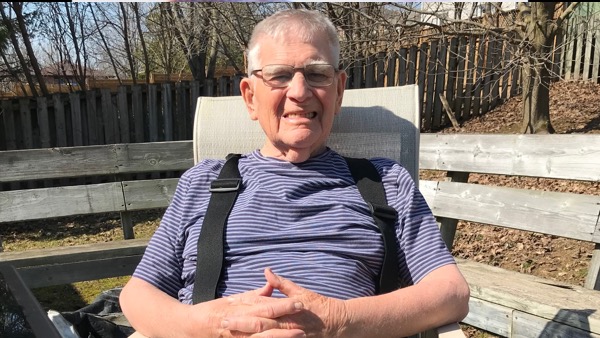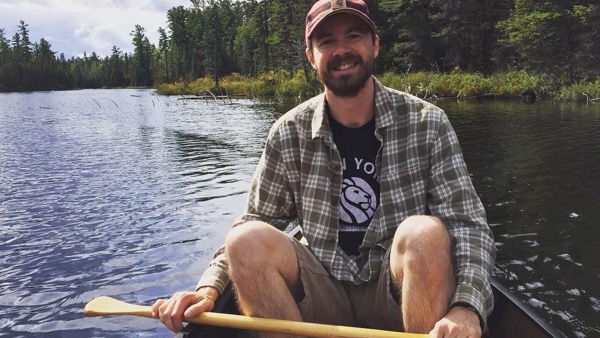Dave Hingsburger died on Sunday, July 18th 2021. To honor Dave we are sharing this piece written by Karin Melberg Schwier which we feel so aptly illustrates Dave’s unbridled commitment to his work. Dave started collaborating with Open Future Learning in 2012. Some of Dave’s most notable contributions to the Open Future site include the modules: Sexuality and Relationships, Boundaries, Personal and Intimate Care, Me and Mine, Diversity, and Abuse Prevention.
The Art of Being Human
Dave Hingsburger sits at the front of the room smiling and sated. To borrow from Psalms: “Be still and know that I am.” It is this point that Dave Hingsburger so clearly defines with his examples, stories and role-plays: Think and feel what it is to be human.
Dave Hingsburger is a renowned sexuality consultant, lecturer, speaker and alarmingly prolific author. He doesn’t mince words and he has a lot of them. His admonitions can be as razor sharp as his wit and praise. People who hear him speak leave like so many limp dishrags from laughing, crying, raging, thinking. It is exactly the response Hingsburger wants. To be in Hingsburger’s presence is to be changed, lifted by the lapels, status quo shaken, then gently lowered to the ground. You are not the same afterwards.
Hingsburger does this ruffling to somewhere between 15,000 and 20,000 people a year. He has lectured in almost every state and province from Alaska to the Yukon to Texas and Louisiana. He has an astonishing Stephen King-esque productivity record that now stands at some 28 books, not including chapters in the works of others, articles in journals, magazines and newspapers, scripts for training films and documentaries. Hingsburger and partner Joe Jobes created Diverse City Press so they could develop plain language, affordable materials on vital issues for direct-support professionals, parents and people with disabilities. No book sells for more than $16. He owes this productivity to an inability to say no.
“I write a lot because I just can’t turn down opportunities to get the word out,” he says. “In one week, for example, I did a two-hour interview for Hustler magazine and a piece for a small religious press. Some might find conflicts between the two. I don’t. If there is an opportunity to intelligently discuss issues pertinent to the right of people with disabilities to have an adult life, I’m there.”
Sticking his face in it with honesty and a razor-blade sense of humor brings admiration from people in the disability field who count on Hingsburger to raise difficult issues and tackle controversial problems. Patty Gibson of the British Columbia Association for Community Living has worked with him many times and appreciates his “inability to gloss over an issue.
Not only is Dave a true original thinker, he’s absolutely fearless,” Gibson says. “While others may tiptoe around certain issues, not wishing to offend or wanting to preserve pleasantries, Dave cuts straight to the heart of the matter. And that matter inevitably has to do with some form of injustice inflicted on people with disabilities.”
Becoming fearless has taken Hingsburger to places he never dreamed he’d go. In fact, as a kid born in Olds, Alberta, who grew up in the interior of B.C., Hingsburger says his childhood was comprised of “equal parts terror and loneliness.” In a school with absolutely no diversity, he recalls, a fat kid was an easy target.
Spending years as a child who tried to avoid being seen, it’s remarkable that Hingsburger chose a career as a public speaker. It’s not that he actually chose it; perhaps it chose him. His very first public lecture did not go entirely as planned.
“Having lied in the job interview where they asked me if I was comfortable doing staff training, I suddenly found myself required to do a one-hour orientation with five staff on the principles of human behavior,” says Hingsburger. “I stood at the front; they all looked at me and years of insecurity flooded my consciousness. I fainted. Flat on the floor. They revived me and I talked non-stop for the remaining 45 minutes and told the class everything I knew about psychology, from Freud to fantasy. It was horrible.”
Despite that shaky beginning, Hingsburger soon discovered there were things he wanted to say about people with disabilities, their rights and the treatment they receive at the hands of others. Training for staff was lacking so he took every chance he could to speak. Parent groups in church basements. Civic groups over rubbery chicken dinners. Front-line staff in small meeting rooms. He got better, having decided that fainting was probably distracting to the audience. “I was determined to get better at getting the message out. Now I do a relaxation procedure about 15 minutes before I start and then a rapid prayer just before I begin and then I’m on.”
Hingsburger became a sexuality consultant at York Behavior Management Services in Ontario. A referral for a young man with an intellectual disability who had touched a child led Hingsburger and others at the clinic to realize that there was only one ethical approach. They would help people with disabilities develop a means of appropriate sexual expression, help agencies develop policies that fostered and encouraged relationships, and help parents see their children as adults with adult needs.
“It’s led to controversial stands,” he says. “I wrote what I believe to be the first article in the literature on supporting lesbians and gay men with developmental disabilities. I wrote and helped film” — not as an actor, he points out — “masturbation training tapes for men and women with disabilities. I have assisted self-advocates in their desire to speak up and speak out against sexual abuse.”
All this speaking up and out and Hingsburger’s absolute conviction that adults with disabilities are sexual beings has led to a variety of reactions. Not everyone is a fan. Hingsburger is absolutely unapologetic about telling people — staff, volunteers, parents, and administrators — when their policies and behaviors at best perpetuate dependency and at worst set people up for abuse. It’s a message that leaves many people squirming in their seats, if not leaving their seats altogether.
“Dave’s insight is exceptionally keen and his sense of humor is always entertaining, but it is his deep respect for people and his truly human perspective that stands out for me,” notes Dr. Dick Sobsey, director of the J.P. Das Developmental Disabilities Centre at the University of Alberta. “He takes on a variety of risky topics… and that sometimes means offending people. But he always makes me think a little deeper, question more of my assumptions and get in touch with genuine feelings about the human condition.”
Nancy Wallace-Gero is an executive director of an Essex County service provider for people with disabilities in Ontario.
“We’ve worked with Dave on a number of innovative projects designed to lower the risk of sexual victimization of people with developmental disabilities,” she says. “His energy, drive, commitment, the brilliance that he exudes, are amazing and inspiring. He is simply the most progressive and creative leader in the field today and his message is what we want our staff to adopt as a guiding principle.”
Hingsburger is well aware of the controversy that sometimes erupts around him. In fact, he regularly runs his thoughts and ideas past leaders in the disability movement. Lucy Gwin, editor of U.S.A.’s Mouth magazine, provides feedback, as does Lisette Lanthier, a woman with an intellectual disability who has co-presented with him on abuse issues. Hingsburger finds that he needs “supervision and support from people with disabilities. Once I have that,” he adds, “damn the torpedoes. I can’t hold back; there’s too much to do.”
Sometimes he receives letters from people who advise that he will “lose his following” if he stays a particular course. He considers such messages hollow threats and is unconcerned, even unaware, about what his “reputation” or “following” might be. Once a lonely, fat child, Hingsburger knows he can survive without the approval of others. So he continues with his message, often through stories of his own experiences. Many are self-deprecating stories in which he has learned a valuable lesson from a self-advocate, a parent or someone who has helped him better understand the human condition. As advice to people starting a career in human services, he recommends that they never cease to “feel and think.
In stories are the truth of human experiences. I know that some stories I tell are painful. Others are funny,” he says. “But life is painful. Life is funny. Sometimes it’s both at the same time. I think that people in human services are attracted by what is authentically human. Data, graphs, numbers are important but they don’t connect with the stuff of life. Parables are remembered; numbers are jotted down and then forgotten.”
Gill Rutherford has known Hingsburger for six years. She coordinates Disability Studies at Dunedin College of Education/Te Kura Akau Taitoka in New Zealand, and cites one of her earlier memories of the keynote speaker.
“I was at the back of the room with the AV guys, who had come in to check that the sound was working okay,” she says. “They usually did a quick check, then headed off for coffee. This time, they stayed. Here they were, two guys with no real interest in disability issues, and Dave had captured them with his first few sentences: ‘This guy’s good…’”
“Dave can move you from laughter to tears in a sentence. My students really appreciate his forthrightness, his insight and, obviously, his humor. He’s a breath of fresh air in academia, and his words provoke students to think about and question what they see happening with people who have disabilities. I believe the purpose of education is to unsettle the mind — Dave does this well.”
Hingsburger’s message has had a profound effect on the field of disability, if official recognition is any indication. The running count of awards to date is long. The first award he ever received was from the Newmarket and District Association for Community Living. It was the Professional of the Year award. It is possibly the most meaningful of all the formal awards he’s received because it was given by people who saw his work firsthand. “Doing ranks higher in my mind than does yapping,” so an award from the Self-Advocate Council of the Ontario ACL for his work to make the world safer for people with disabilities is also treasured, and it still moves him to tears. The prestigious Dana Sambour Award from the Committee on Sexuality on the U.S. west coast, the Pioneer Award from the U.S. Institute on Dual Diagnosis and a leadership award from the Young Adult Institute all rank among his most memorable.
But the one that comes out on top isn’t a plaque. Hingsburger assisted in a legal case involving a woman with a disability who was brutalized. He was impressed with how the police officer handled the case, and told him so. Hingsburger was surprised with the officer’s response: “I was at one of your training sessions and I followed the advice you gave.” Hingsburger is confident there will be a conviction in the case. To him, that’s the best award of all.
While he deals with the darkest sides of humanity and is continually reminded that people with disabilities are still caged by systems, isolated by fearful parents and victimized by predators, he is a hopeful man. He tells of sneaking into a large institution at night. Standing in the middle of an empty ward, he says, he “could still smell captivity.” But he was enraptured by the sound of silence, of emptiness. He felt the knowledge that he is part of a movement that has set people free and “it felt good.” He is proud when he sees people with disabilities working in the community, waiting for a city bus, doing the ordinary things that have been out of reach for so long.
“Once I found myself crying simply because I was watching an elderly woman with a developmental disability make butter tarts,” he recalls. “She moved about in freedom as if the air had the buoyancy of water. This is what we work for: real lives in real communities for real people.”
A few years ago, Hingsburger nearly died. This not only alarmed him and those closest to him. It also had a great many people holding a collective breath as they watched a significant light flicker and grow dim.
“All I can say is that I understood, really for the first time, what quality of life is. And what it isn’t. Boy,” he sighs, “have we made some mistakes.”
Still, 20,000 people cross paths with Hingsburger each year and thousands more read his books, see his videotapes, conduct training with his instructional materials and quote his parables. In one of his seminars, hundreds will experience the simple act of feeding another human being a cookie and will, in return, receive that communion from another human being. They will be asked to reflect on this profound act of being with another person: “Be still and know that I am.” And each will become a better human being in the process.
As evidence that his wicked sense of humour burns again at full flame, Hingsburger chuckles as he ponders the question of what might be written on his tombstone when he does finally shuffle off this mortal coil.
“God finally shut him up.”
By Karin Melberg Schwier
Original article at: http://www.karinschwier.ca
(Karin Melberg Schwier of Saskatoon, Saskatchewan, is the parent of three; the eldest son has a disability. She is also an author whose most noted works are about people with disabilities. She co-authored with Dave Hingsburger Sexuality: Your Sons and Daughters with Intellectual Disabilities (Brookes Publishing, 2000). Most recently, her debut novel Small Reckonings has earned literary awards; she had been in touch with Dave several weeks ago about researching repressed memories of assault in people with disabilities for the novel’s sequel. The Art of Being Human first appeared in Abilities magazine.






